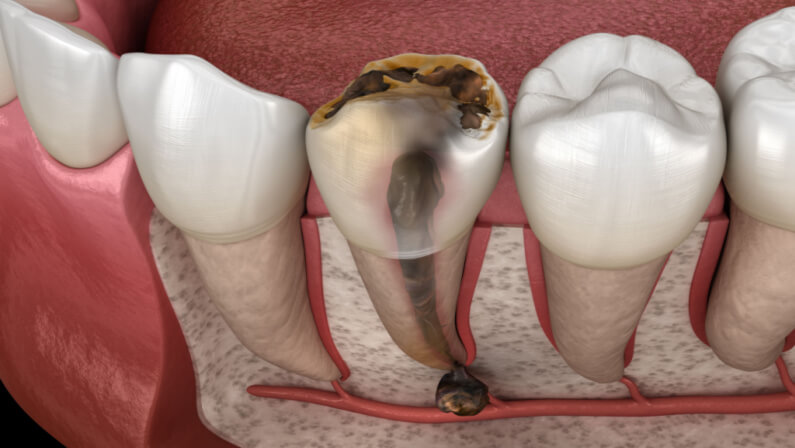Gum disease can be avoided and combated with good dental hygiene. Therefore, it’s crucial to brush and floss frequently, as well as visit the dentist for regular cleanings twice a year.
But occasionally, a dentist will advise having your teeth thoroughly cleaned. Gums that are bleeding, receding, or have become loose are indications that you may need a deep cleaning.
A dentist’s deep cleaning, also known as periodontal scaling or root planing, carries some disadvantages despite being common.
What you need to know about deep cleaning your teeth, including its drawbacks, is provided here.
What Is Dental Deep Cleaning?

By removing plaque and tartar that have accumulated on your teeth, a deep teeth cleaning can reduce gum inflammation and enhance gum health.
A sticky coating known as plaque develops on teeth. It forms when saliva and food particles combine and contain microorganisms. Plaque, which builds up on teeth every day, can be removed by brushing your teeth.
However, brushing alone won’t get rid of all the plaque between your teeth. Tartar is created when leftover plaque calcifies or hardens.
Gum disease can be brought on by plaque or tartar buildup. This includes gingivitis, a gum condition characterized by inflammation. Gingivitis can progress to periodontitis if neglected.
What Benefits Are There To Deep Cleaning Your Teeth?
If gum disease causes your gums to move away from your teeth, leaving a space more than 5 millimeters (mm) deep, you could need a deep cleaning.
The distance between your gums and teeth may continue to grow if gum disease gets worse. This may weaken the bones that hold your teeth in place, leading to missing or loose teeth.
Benefits of thorough cleaning, if your dentist suggests one, include:
- halting the spread of gum disease.
- treating an existing infection and fostering recovery
- brushing your teeth from the gum line down
- removing gum disease-related foul breath
- preserving the teeth’s roots
What Drawbacks Are There To Deep Cleaning Your Teeth?

Gum disease can be treated with extensive cleaning, but there are risks involved.
The following are drawbacks of deep cleaning your teeth:
- causes nerve damage,
- doesn’t guarantee that your gums will reattach to your teeth,
- may cause your gums to recede, and can cause discomfort and sensitivity if you have a weak immune system.
Deep cleaning risks are typically minor and only last for around 5 to 7 days, though in extreme circumstances they may last for many weeks.
What Does Deep Cleaning Teeth Involve?
Following are the steps involved in a deep cleaning at the dentist:
Pre-Appointment Diagnosis
Using a periodontal probe to measure the space between your teeth and gums, your dentist will look for gum disease before doing your deep cleaning. Gum disease is indicated if the gap is greater than 3 millimeters. Additionally, your dentist will check to see if any of your teeth are loose or if your gums are bleeding, irritated, or both.
Gingivitis, periodontitis, and advanced periodontitis are the three phases of gum disease. Your dentist will typically ask you to get an x-ray of your teeth since periodontitis can result in bone loss, which will be visible on the x-ray.
Your First Deep Teeth Cleaning Appointment

Usually, two appointments are needed to perform a deep cleaning of the teeth. This is due to the fact that at each appointment, your dentist will numb and treat one side of your mouth using local anesthesia.
To ensure you don’t experience any pain throughout the procedure, the dentist will either apply a numbing lotion or administer local anesthesia by injection into your gums.
Your dentist might use an ultrasonic instrument that vibrates to remove tartar and plaque from hard-to-reach places or areas where the tartar is particularly difficult to remove.
Your Second Deep Cleaning Appointment
Your dentist will use the same methods they used to treat one side of your mouth at your first session to treat the opposite side of your mouth. Additionally, they will assess how the side of your mouth that has previously received treatment feels and is healing after the deep cleaning.
Each appointment is expected to last at least an hour and maybe up to four hours. If your infection is serious, you could require extra care, such as an antibiotic gel injection straight into the space between your teeth and gums.
To treat the illness, you can also be given antibiotic tablets or a powerful mouthwash.
Your Follow-Up Deep Cleaning Appointment
Your dentist will schedule a follow-up appointment for you following your second thorough cleaning session, which is typically scheduled two weeks later. Your dentist will measure the size of the pockets between your teeth and gums during this session to check if they have shrunk.
You might be sent to a specialist for additional care based on the outcomes of your thorough cleaning.
Does Deep Cleaning Hurt?
Because teeth scaling and root planing can be uncomfortable, your gums will be numbed with a topical or local anesthetic.
After your therapy, you should anticipate some sensitivity. You can also experience some little bleeding and swollen gums.
How Often Is Deep Cleaning Needed?

Gum disease is treated with deep cleaning, usually after an advanced stage. If you practice appropriate dental hygiene after having your teeth deep cleaned, you should, in theory, just require one deep clean. To stop gum disease from relapsing, regular non-deep dental cleaning appointments are also necessary.
Brownstone Dental can give you the dental treatment you require, whether you require preventative care to avoid dental problems from arising or aesthetic and restorative dentistry services to address current ones.
Call us to make an appointment if you live in Houston, Texas.
How Much Does A Teeth Cleaning Cost
If you want to know how much teeth cleaning is, the price of a deep cleaning varies according to how bad the gum disease or swelling is.
Although some people may require up to four visits to completely eliminate tartar and plaque, you’ll probably only need two. Your mouth is examined in quadrants during these cleanings.
The Bottomline
Thorough teeth cleaning aids in the elimination of foul breath and encourages the recovery of gum disease. It’s critical to comprehend any potential issues or side effects because deep cleanings do carry some danger.
You should anticipate some sensitivity and edema following the treatment, despite the fact that it is typical and safe.
Consult your dentist if swelling, bleeding, or pain persists for more than a week following your surgery.